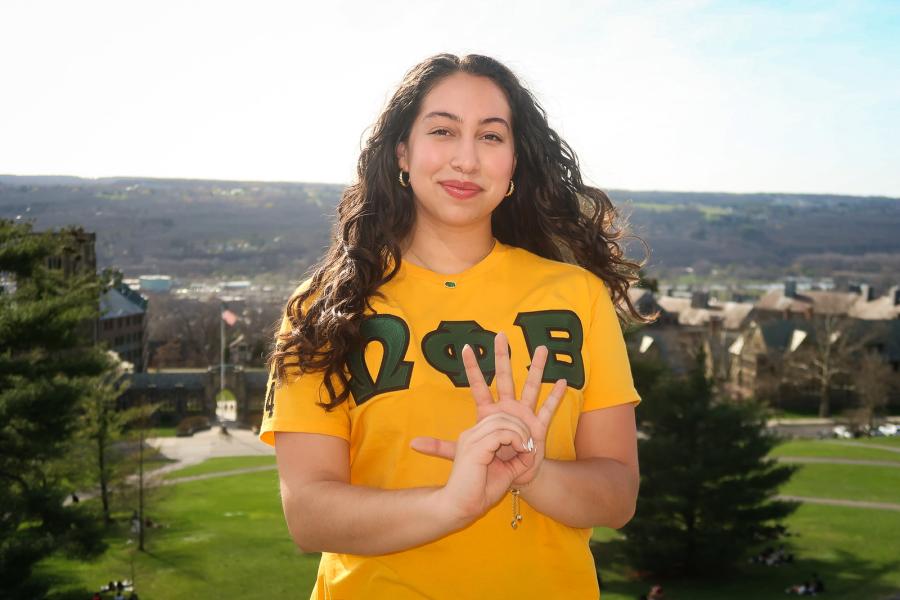Andrea Zarazúa
Biology & Society and Spanish
Los Angeles, Calif.
What was your favorite class and why?
My favorite class was SPAN 3710: Latin American Documentary taught by Dr. Irina Troconis. I can talk for hours about my love for the Spanish major and how impactful it can be in the lives of students, and I feel that this class was truly a testament to all the benefits that the major has to offer. I was able to learn about Latin American history while also engaging in film analysis, a skill that I had never practiced before. The class allowed me to be creative and analytical by asking me to analyze documentary films, which are both a form of artistic expression and a medium that engages in historical truth telling. In addition, I believe that this class was also a representation of how the humanities work to build empathy in students in ways that STEM classes cannot. Dr. Troconis encouraged us to think about what these people in the documentaries were feeling and experiencing and how these experiences were transmitted and shaped through film.
What Cornell memory do you treasure the most?
In October of my freshman year, my closest friend went home for Halloween weekend. Because it was only the first few months of freshman year, I was still making friends and did not really have anyone to spend Halloween with. However, early in that week one of the women that I knew from the Biology Scholars Program invited me to spend the weekend with her and her friends. Honestly, I thought she would forget about the plans. I learned pretty quickly at Cornell that all of us are extremely busy students, and sometimes social commitments get lost in the chaos of academics and extracurriculars. However, despite all my pessimism, she showed up outside my dorm on Halloween night with her groups of friends. I remember it was raining, and three of us were sharing her umbrella as we walked from North campus to Collegetown. I thanked her for the umbrella and for coming to pick me up, and she responded as if remembering to come get me was always a given. Her name was Alian, and she is now one of my best friends, my sorority sister and my senior year roommate. Although it may seem insignificant, her showing up that night was a reminder that I mattered. Cornell is a big place and it can be easy to feel lost and isolated without a good group of friends surrounding you. My friends have taught me that sometimes the most important moments are the most ordinary ones. I will forever cherish every study session, every dining hall dinner and every late night trip to Bear Necessities or 7-Eleven. I will remember the nervous walks to prelims, the afternoons on the slope and the countless executive board meetings. Because friendships are just collections of hundreds of ordinary moments. This is to say, they are outcomes of moving through life alongside and with one another.

What are the most valuable skills you gained from your Arts & Sciences education?
As a double major, one of the most valuable skills I have learned through Arts & Sciences has been the ability to incorporate multiple perspectives into my worldview. I have been able to study biology, chemistry, sociology, anthropology and Spanish. All of these subjects have contributed to how I see the world around me and how I want to impact the world after graduation. Every semester, I was able to take classes that actually complemented each other. Overall, I feel that Arts & Sciences has taught me the value of putting seemingly unrelated subjects in conversation with one another, enriching my education and my understanding of complex issues.
What have you accomplished as a Cornell student that you are most proud of?
Earlier this semester, I was accepted into “We Are La Voz: Resilience Through Art” Group Exhibition, which is an art exhibition for Latinx artists in the Ithaca area. I will be exhibiting a crochet tapestry I made as part of an archival project for one Dr. Sara Warner’s classes on queer archives. The tapestry depicts Robert Garcia, an AIDS activist and one of the co-founders of the Latino caucus of ACT UP. I feel most proud of this accomplishment because I was able to use my artistic ability to create a physical representation of research I spent months on. I also feel that this archival project was just as emotional and empathetic as it was artistic. It pushed me to understand how I personally can participate in creating art that engages in activism and incorporates my multifaceted perspective of public health issues such as the AIDS crisis.
How have your beliefs or perspectives changed since you first arrived at Cornell?
I have always been a very curious person. I knew coming into Cornell that I was someone who enjoyed academics and felt confident in academic spaces. However, I never imagined just how much information I could process in such a short amount of time. Although I can’t pinpoint exactly how my perspectives may be different, I can feel that they have expanded in a way that would not have been possible without Arts & Sciences. I am able to take papers that I read in a medical anthropology class and analyze them alongside a documentary I watch for my Spanish class. In this sense, one of the things that I have discovered about myself is that my learning is limitless. I have also learned that my love for learning is truly rooted in not only my curiosity, but also my excitement at the prospect of building interdisciplinary perspectives.
Every year, our faculty nominate graduating Arts & Sciences students to be featured as part of our Extraordinary Journeys series.Read more about the Class of 2025.




